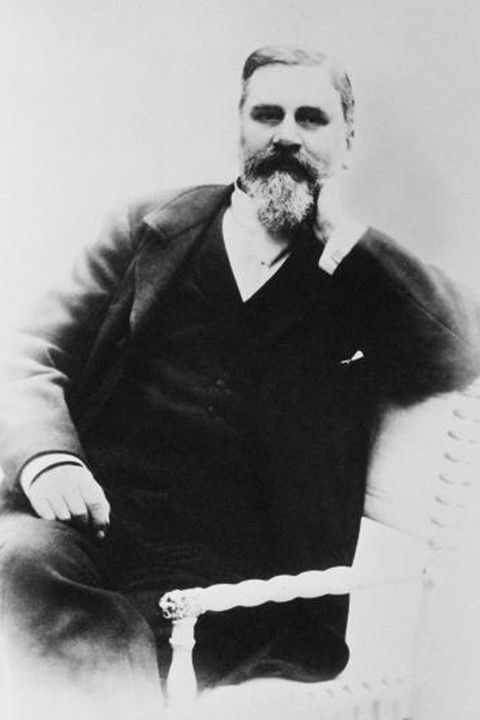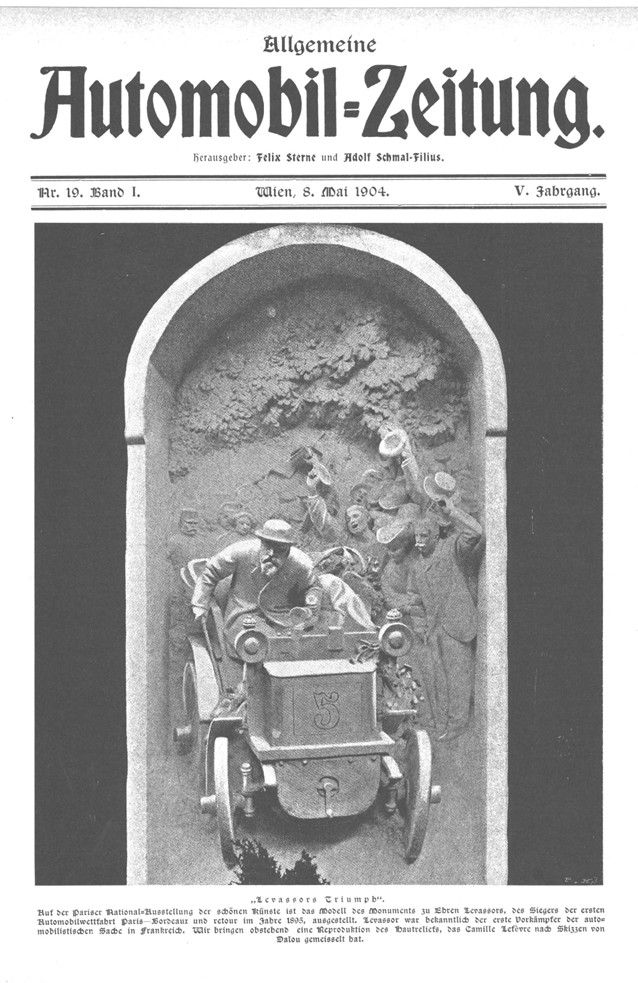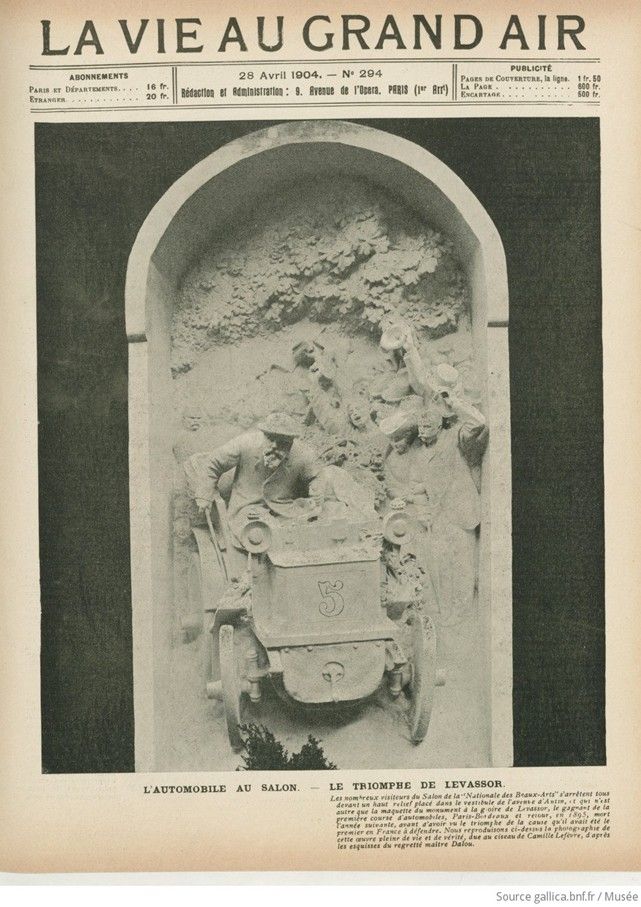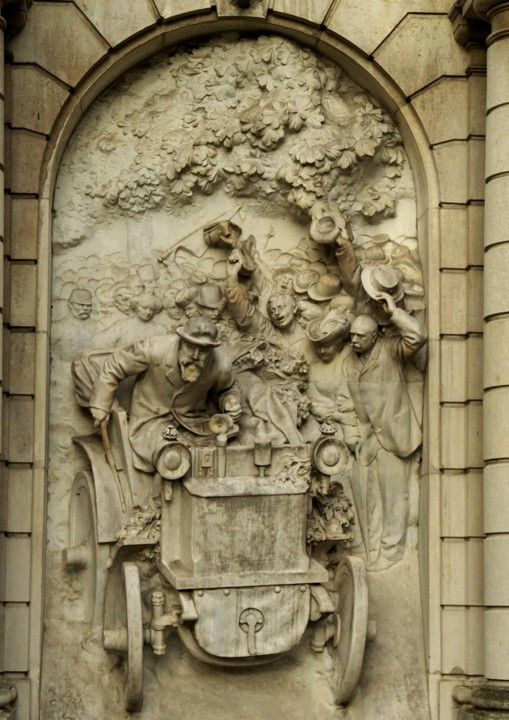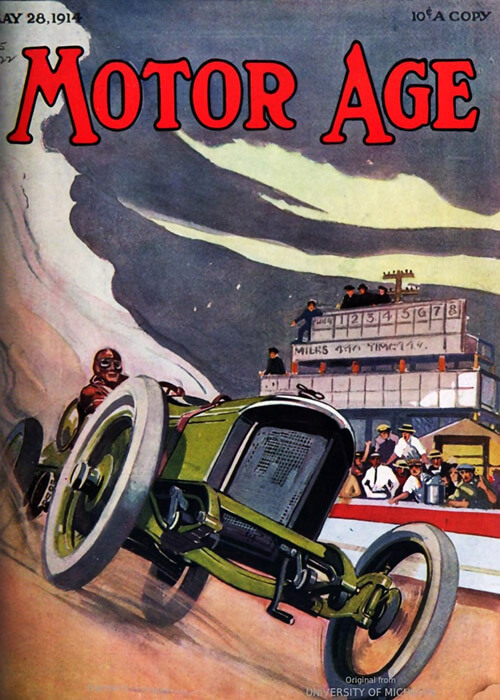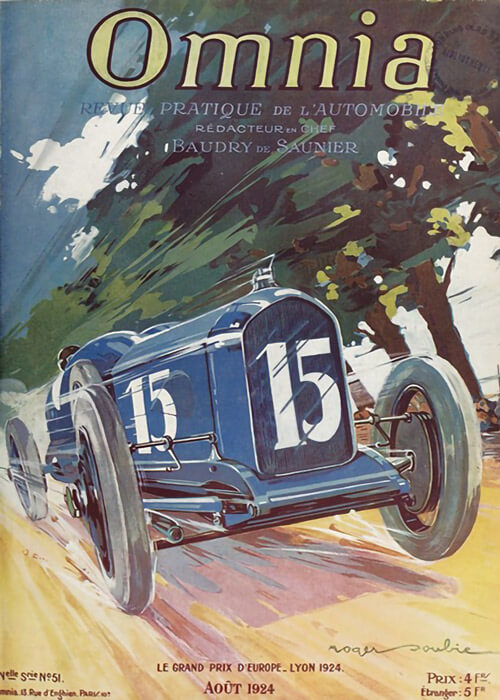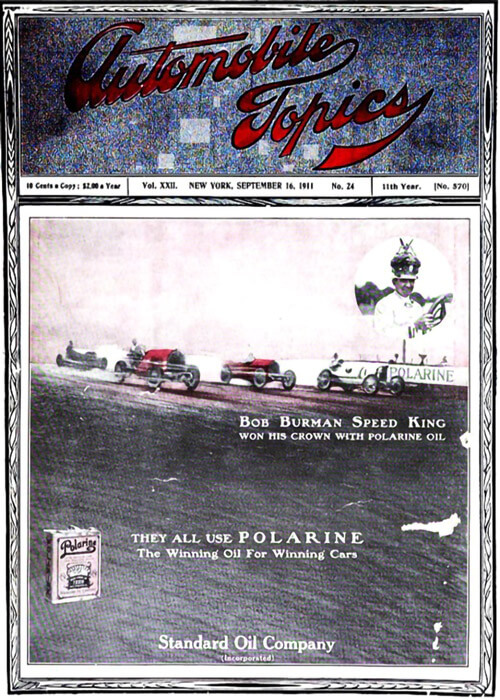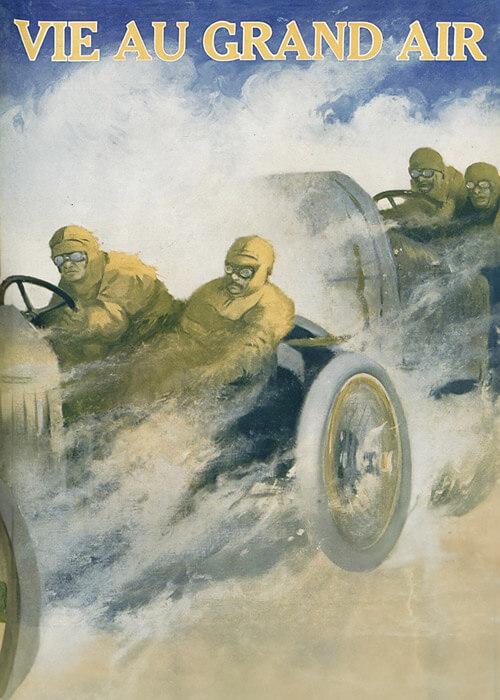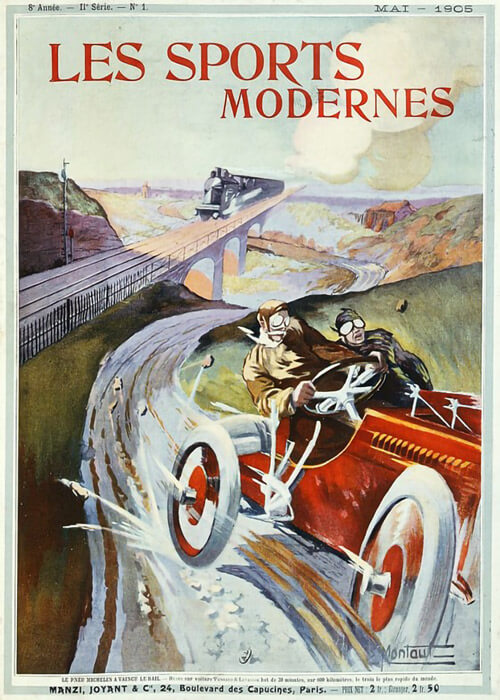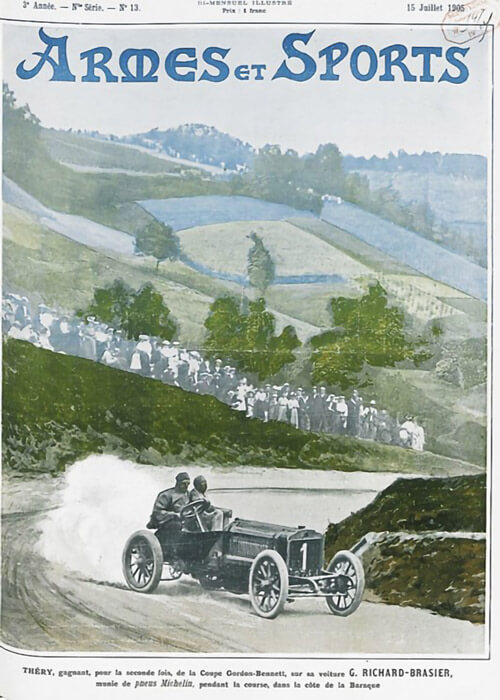This article appeared in the French Grand Prix theme issue of La Vie au Grand Air. Here, Mr. Fanor, one of the participants (and a winner) in the 1895 Course Paris-Bordeaux, shares his experience of that very race. From his story, I take it, that he was a realively young co-passenger in one of the competing Peugeot Phaetons.
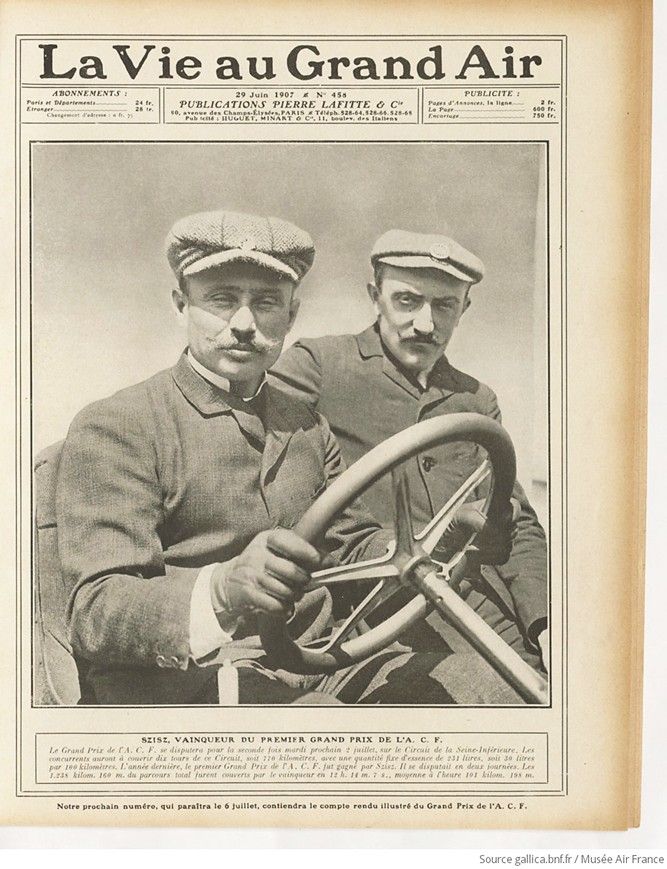
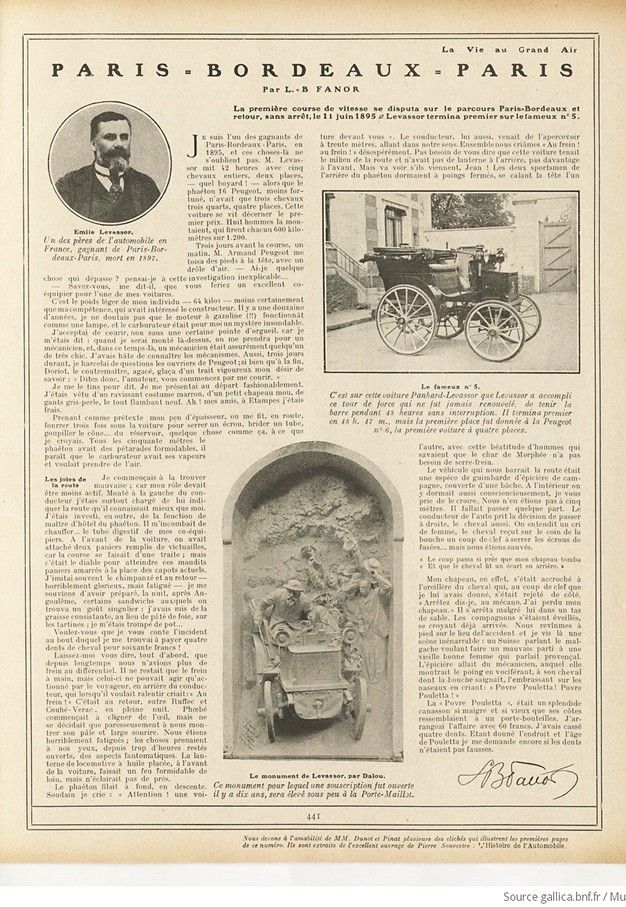
Texte et photos avec l’autorisation du Bibliothèque national français, gallica.bnf.fr/ https://www.bnf.fr/fr
Text and fotos compiled by motorracinghistory.com
La Vie au Grand Air, Vol. 10, No. 458, 29 juin 1907
PARIS – BORDEAUX – PARIS – Par L. B FANOR
La première course de vitesse se disputa sur le parcours Paris=Bordeaux et retour, sans arrêt, le 11 juin 1895
Levassor termina premier sur le fameux n°5.
JE suis l’un des gagnants de Paris-Bordeaux-Paris, en 1895, et ces choses-là ne s’oublient pas. M. Levassor mit 42 heures avec cinq chevaux entiers, deux places, — quel boyard ! — alors que le phaéton 16 Peugeot, moins fortuné, n’avait que trois chevaux trois quarts, quatre places. Cette voiture se vit décerner le premier prix. Huit hommes la montaient, qui firent chacun 600 kilomètres sur 1.200.
Trois jours avant la course, un matin, M. Armand Peugeot me toisa des pieds à la tête, avec un drôle d’air. — Ai-je quelque chose qui dépasse ? pensai-je à cette investigation inexplicable…
— Savez-vous, me dit-il, que vous feriez un excellent coéquipier pour l’une de mes voitures.
C’est le poids léger de mon individu — 64 kilos — moins certainement que ma compétence, qui avait intéressé le constructeur. Il y a une douzaine d’années, je ne doutais pas que le moteur à gazoline (!!) fonctionnât comme une lampe, et le carburateur était pour moi un mystère insondable.
J’acceptai de courir, non sans une certaine pointe d’orgueil, car je m’étais dit : quand je serai monté là-dessus, on me prendra pour un mécanicien, et, dans ce temps-là, un mécanicien était assurément quelqu’un de très chic. J’avais hâte de connaître les mécanismes. Aussi, trois jours durant, je harcelai de questions les ouvriers de Peugeot ; si bien qu’à la fin, Doriot, le contremaître, agacé, glaça d’un trait vigoureux mon désir de savoir : « Dites donc, l’amateur, vous commencez par me courir. »
Je me le tins pour dit. Je me présentai au départ fashionablement. J’étais vêtu d’un ravissant costume marron, d’un petit chapeau mou, de gants gris-perle, le tout flambant neuf. Ah ! mes amis, à Etampes j’étais frais.
Prenant comme prétexte mon peu d’épaisseur, on me fit, en route, fourrer trois fois sous la voiture pour serrer un écrou, brider un tube, goupiller le cône… du réservoir, quelque chose comme ça, à ce que je croyais. Tous les cinquante mètres le phaéton avait des pétarades formidables, il paraît que le carburateur avait ses vapeurs et voulait prendre de l’air.
Les joies de la route
Je commençais à la trouver mauvaise ; car mon rôle devait être moins actif. Monte a la gauche du conducteur j’étais surtout chargé de lui indiquer la route qu’il connaissait mieux que moi.
J’étais investi, en outre, de la fonction de maître d’hôtel du phaéton. Il m’incombait de chauffer… le tube digestif de mes co-équipiers. A l’avant de la voiture, on avait attaché deux paniers remplis de victuailles, car la course se faisait d’une traite ; mais c’était le diable pour atteindre ces maudits paniers amarrés à la place des capots actuels.
J’imitai souvent le chimpanzé et au retour — horriblement glorieux, mais fatigué — je me souviens d’avoir préparé, la nuit, après Angoulême, certains sandwichs auxquels on trouva un goût singulier : j’avais mis de la graisse consistante, au lieu de pâté de foie, sur les tartines ; je m’étais trompé de pot…
Voulez-vous que je vous conte l’incident au bout duquel je me trouvai à payer quatre dents de cheval pour soixante francs !
Laissez-moi vous dire, tout d’abord, que depuis longtemps nous n’avions plus de frein au différentiel. Il ne restait que le frein à main, mais celui-ci ne pouvait agir qu’actionné par le voyageur, en arrière du conducteur, qui lorsqu’il voulait ralentir criait : « Au frein ! » C’était au retour, entre Ruffec et Couhé-Verac, en pleine nuit. Phœbé commençait à cligner de l’œil, mais ne se décidait que paresseusement à nous montrer son pâle et large sourire. Nous étions horriblement fatigués ; les choses prenaient à nos yeux, depuis trop d’heures restés ouverts, des aspects fantomatiques. La lanterne de locomotive à huile placée, à l’avant de la voiture, faisait un feu formidable de loin, mais n’éclairait pas de près.
Le phaéton filait à fond, en descente. Soudain je crie : « Attention ! une voiture devant vous ». Le conducteur, lui aussi, venait de l’apercevoir à trente mètres, allant dans notre sens. Ensemble nous criâmes « Au frein au frein ! » désespérément. Pas besoin de vous dire que cette voiture tenait le milieu de la route et n’avait pas de lanterne à l’arrière, pas davantage à l’avant. Mais va voir s’ils viennent, Jean ! Les deux sportsmen de l’arrière du phaéton dormaient à poings fermés, se calant la tête l’un l’autre, avec cette béatitude d’hommes qui savaient que le char de Morphée n’a pas besoin de serre-frein.
Le véhicule qui nous barrait la route était e espèce de guimbarde d’épicière de campagne, couverte d’une bâche. A l’intérieur on y dormait aussi consciencieusement, je vous prie de le croire. Nous n’en étions pas à cinq mètres. Il fallait passer quelque part. Le conducteur de l’auto prit la décision de passer à droite, le cheval aussi. On entendit un cri de femme, le cheval reçut sur le coin de la bouche un coup de clef à serrer les écrous de fusées… mais nous étions sauvés.
« Le coup passa si près que mon chapeau tomba
« Et que le cheval fit un écart en arrière. „
Mon chapeau, en effet, s’était accroché à l’oreillère du cheval qui, au coup de clef que je lui avais donné, s’était rejeté de côté.
« Arrêtez dis-je, au mécano. J’ai perdu mon chapeau. » Il s’arrêta malgré lui dans un tas de sable. Les compagnons s’étaient éveillés, se croyant déjà arrivés. Nous revînmes à pied sur le lieu de l’accident et je vis là une scène inénarrable : un Suisse parlant le malgache voulant faire un mauvais parti à une vieille bonne femme qui parlait provençal.
L’épicière allait du mécanicien, auquel elle montrait le poing en vociférant, à son cheval dont la bouche saignait, l’embrassant sur les naseaux en criant : « Povre Pouletta! Povre Pouletta ! »
La « Povre Pouletta », était un splendide canasson si maigre et si vieux que ses côtes ressemblaient à un porte-bouteilles. J’arrangeai l’affaire avec 60 francs. J’avais cassé quatre dents. Etant donné l’endroit et l’âge de Pouletta je me demande encore si les dents n’étaient pas fausses.
L. B FANOR
Explanation des photos.
Emile Levassor.
Un des pères de l’automobile en France, gagnant de Paris-Bordeaux-Paris, mort en 1897.
Le fameux no 5.
C’est sur cette voiture Panhard-Levassor que Levassor a accompli ce tour de force qui ne fut jamais renouvelé, de tenir la barre pendant 48 heures sans interruption. Il termina premier en 48 h. 47 m., mais la première place fut donnée à la Peugeot n° 6, la première voiture à quatre places.
Le monument de Levassor, par Dalou.
Ce monument pour lequel une souscription fut ouverte il y a dix ans, sera élevé sous peu à la Porte-Maillot.
——–
Nous devons à l’amabilité de MM. Dunot et Pinat plusieurs des clichés qui illustrent les premières pages de ce numéro. Ils sont extraits de l’excellent ouvrage de Pierre Souvestre : L’Histoire de l’Automobile.
Translation by DeepL.com, corrected by motorracinghistory.com
PARIS – BORDEAUX – PARIS By L. B FANOR
The first speed race was contested on the Paris-Bordeaux and return route, non-stop, on 11 June 1895 – Levassor finished first on the famous n°5.
I am one of the winners of Paris-Bordeaux-Paris in 1895, and these things are not forgotten. It took Mr Levassor 42 hours with five full horses, two seats, – what a guy! – whereas the Peugeot phaeton 16, less fortunate, had only three and a quarter horsepower and four seats. This car was awarded first prize. Eight men were on it, each covering 600 kilometres out of 1,200.
One morning, three days before the race, Mr Armand Peugeot looked at me from head to toe with a funny expression. – Is there something wrong with me? I thought to myself at this inexplicable investigation…
– Did you know,“ he said to me, „that you’d make an excellent team-mate for one of my cars?
It was my light weight – 64 kilos – less certainly more than my competence, that had interested the manufacturer. A dozen years ago, I had no doubt that the gasoline engine (!!) worked like a lamp, and the carburettor was an unfathomable mystery to me.
I agreed to race, not without a certain amount of pride, because I told myself: when I got up there, people would take me for a mechanic, and in those days, a mechanic was certainly a very smart person. I couldn’t wait to get to know the mechanisms. So, for three days, I harrassed the Peugeot workers with questions, so much so that in the end, Doriot, the foreman, got annoyed and froze my desire to know with a vigorous reply: „Hey, amateur, you’re starting to annoy me“.
I kept my mouth shut. I presented myself fashionably at the start. I was dressed in a delightful brown suit, a little floppy hat and pearl-grey gloves, all brand new. Ah, my friends, in Etampes I was new.
Using my light posture as an excuse, underway, I was made to crawl under the car three times to tighten a nut, clamp a tube, pin the cone… of the tank, something like that, or so I thought. Every fifty metres the phaeton made a tremendous backfire; it seemed that the carburettor had its vapour-lock and needed some air.
The joys of the road
I was beginning to feel bad, because my role became less active. Mounted left of the driver, I was particularly charged to show him the route, which he knew better than I did. Furthermore, I was entrusted with the function of the phaeton’s butler.
It was my job to warm up …… the digestive tracts of my teammates. At the front of the car, we had attached two baskets filled with food and drinks, because the race would be run in one; but it was the devil of a job to get to these cursed baskets held in place of the current bonnets.
I often imitated the chimpanzee and, on the way back – horribly glorious, but tired – I remember having prepared, during the night, after Angoulême, certain sandwiches to which they found a singular taste: I had put thick grease, instead of liver pâté on the toast; I had used the wrong pot…
Would you like me to tell you the story of the incident at which end I found myself paying sixty francs for four horse teeth!
First of all, let me tell you that we hadn’t had a differential brake for a long time. All that remained was the handbrake, but that could only be operated by the passenger behind the driver, who, when he wanted to slow down, shouted „On the brakes! It was on the return, between Ruffec and Couhé-Verac, in the middle of the night. Phœbé started to wink one eye, but only lazily decided to show us her pale, broad smile. We were horribly tired; things looked ghostly to our eyes, which had been open for too many hours. The oil locomotive lantern at the front of the carriage gave off a formidable light at a distance but did not illuminate close nearby.
The phaeton was speeding downhill. Suddenly I shouted: „Look out! There’s a car in front of you“. The driver had also just seen it thirty metres away, heading in our direction. Together we desperately shouted „On the brake, on the brake! I don’t need to tell you that this car held the middle of the road and didn’t have a lantern at the back, nor one at the front. But go and see if they come, Jean! The two sportsmen in the back of the phaeton were sleeping tight, cradling each other’s heads with the blessed attitude of men who know that Morpheus‘ chariot needs no brakeman.
The vehicle that blocked our route was sort of country grocer’s jeep, covered with a tarpaulin. On the inside, people were sleeping just as conscientiously, please believe me. We weren’t five metres from it. We had to pass somewhere. The driver of the car took the decision to go right, so did the horse too. One heard a woman’s scream; the horse was hit on the corner of the mouth with a spanner that could tighten rocket nuts… but we were saved.
„The blow came so close that my hat fell off.
„And the horse made a swerve backwards. *
My hat, in fact, had caught on the horse’s ear and, when I hit it with the key, it threw itself sideways.
“Stop,“ I said to the mechanic. I’ve lost my hat. He stopped, despite of that, in a heap of sand. The companions had woken up, thinking they had already arrived. We returned on foot to the scene of the accident and there I saw an incredible scene: a Swiss man speaking Madagascar, trying to make a fool of an old woman who spoke Provençal. The grocer went to the mechanic, to whom she shook her fist and shouted, to his horse, whose mouth was bleeding, embracing the nose while shouting: „Poor Pouletta! Poor Pouletta!“
The “Poor Pouletta“ was a splendid horse so meagre and old that his ribs looked like a bottle-holder. I arranged the deal for 60 francs. I had knocked out four teeth. Given the location and Pouletta’s age, I still wonder if the teeth weren’t fake. L. B FANOR
Photo captions.
Emile Levassor.
One of the fathers of the automobile in France, winner of Paris-Bordeaux-Paris, died in 1897. (from Tuberculosis)
The famous No 5.
It is on this Panhard-Levassor car that Levassor has accomplished the never-to-be-repeated feat of holding the tiller (handle bar) for 48 hours without interruption. He finished first in 48 h. 47 m., but first place went to Peugeot no. 6, the first four-seater.
The Levassor monument, by Dalou.
This monument, for which a subscription was opened ten years ago, will be erected soon at the Porte-Maillot.
——–
We are indebted to the kindness of Messrs Dunot and Pinat for several of the photographs that illustrate the first pages of this issue. They are taken from Pierre Souvestre’s excellent work: L’Histoire de l’Automobile.
